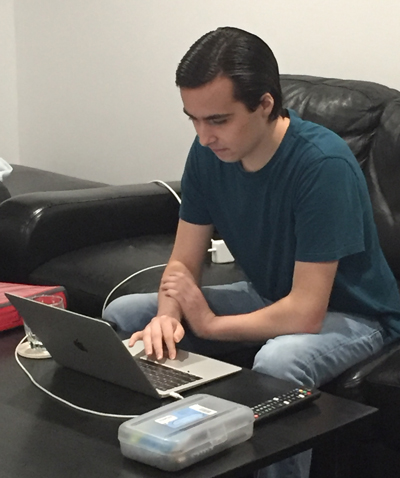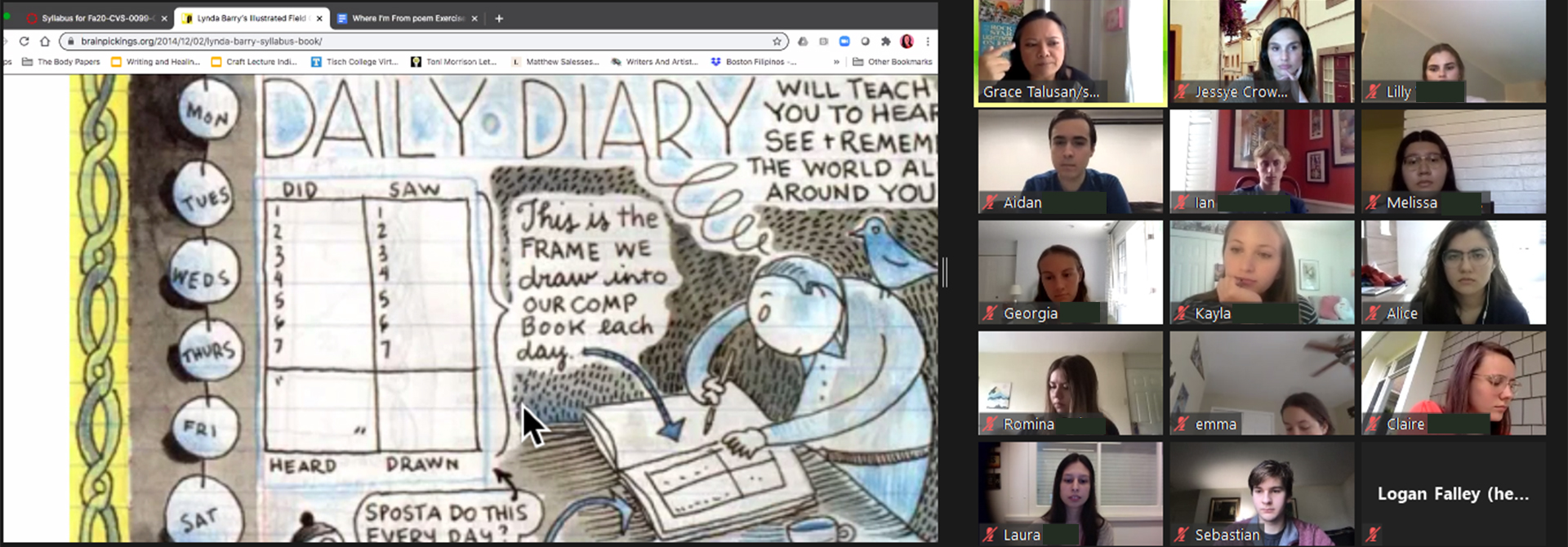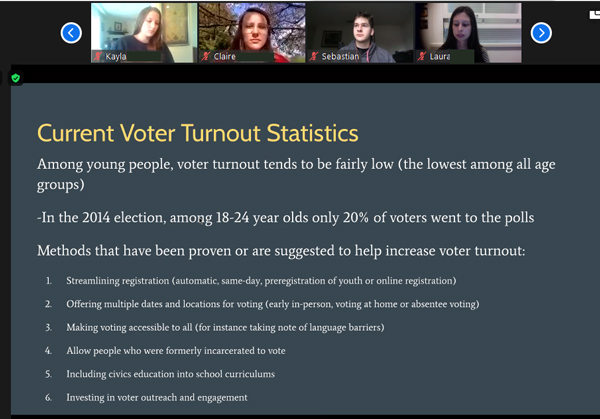Aidan is a student from Connecticut who joined our first cohort of the Civic Action Gap Semester, an exciting partnership program in collaboration with the Tufts University Jonathan M. Tisch College of Civic Life. He shared a bit about his experience with AMIGOS, including his final civic engagement project, taking virtual Spanish language classes, and the Tufts University course curriculum.
On his project:
For my civic engagement project, I am organizing letter writing between the elderly and sixth-graders in my hometown. This is meaningful to me because the project was inspired by a similar program that I was involved in since I was in the third grade. This program was called Shining Stars and when I first participated in it, I was paired with a senior at the local senior center and throughout the year we would exchange letters and meet in person for parties organized at the senior center or in the classroom.
Since then, my mother had been involved with the senior center, so a few times a year I would be able to help out with the party organizing and I would be able to check in with the senior that I had been paired with, as well as my third-grade teacher.
This year, the program is unable to occur because of the pandemic, since in-person meetings are not possible and the teachers do not have the time to put into the program. Unfortunately, a program like Shining Stars is most needed at a time like this, since many seniors are lacking many of the activities and social gatherings that they were once able to do before the pandemic. Students are also spending extended periods of time in front of their screens due to online classes and social distancing restrictions.
This is where my project comes in, currently named the Ledyard Cross-Generational Connection Project (LCGCP). Ledyard is the name of my hometown.
Due to the restrictions of the pandemic, I decided that letter writing would be the best way to connect students with seniors since no technology skills were required and there would be no need for in-person meetings.
I was able to get in contact with the superintendent of the town’s school system and was able to identify a sixth-grade class that was willing to participate in the program. I was also able to identify numerous seniors around my town who were also interested in writing letters to the sixth-graders. Now I am ready to launch the project, as I have completed making an action plan as well as sample letters for the participants to read. The current plan is for the program to run for about a month, allowing for multiple letters to be exchanged and this will hopefully give the participants a new activity to help pass the time during the pandemic by giving them someone new to talk to.

On Spanish classes:
I am really enjoying my Spanish classes so far! We meet twice a week for an hour and a half each class. There are two other people in my class, though some classes have just been me with the instructor. There are certainly some challenges in having a class virtually, however, I believe that we are able to overcome all of them.
We all come from different states and countries, including Brazil, Connecticut, Maryland, and Nicaragua, where the instructor lives. I personally find the virtual classes can be quite advantageous at times since we are able to easily access resources that the instructor shares with us and we can also quickly access a Spanish-English dictionary to look up any words that we don’t know.
Due to all of our different backgrounds, the Spanish classes are fantastic for promoting cultural exchanges since we all have different perspectives and experiences.
To give one example, for one of the classes a week ago, everyone including the instructor gave a presentation about their home country and region, allowing everyone to learn more about the places we call home and ask questions if we wanted to know more. Before the program, I knew very little about Central America in general and especially Nicaragua, but through these classes and especially the presentation I mentioned earlier, my understanding of the country has certainly increased.
During class, we are able to have conversations about our own countries, including current events, cultural differences, etc. One thing I’ve learned about Nicaragua is that they have a lot of volcanoes, which I found fascinating because I had never heard about them occurring in Central America before and it was really interesting to hear the instructor describe them.

Before the program, I had taken about 6 years of Spanish in school and while my reading and writing level was quite good, my speaking level was nowhere near as refined. These classes have been perfect for improving my conversational skills, as the environment is much more comfortable than a typical high school classroom and the other two students in the class with me are at a very similar level. Therefore, the class is able to move at a very comfortable pace and allows me to get plenty of practice with conversations without the fear of mistakes, bad grades, or falling behind the rest of the class which was present in high school.
From the start of class, we were able to quickly review the grammar and verb tenses to make sure we were all on the same page. Mistakes are normal and expected to occur in the class, so whenever I use a verb tense incorrectly or if I say the wrong word, the instructor is able to quickly and kindly correct the mistake.
Out of every Spanish class I have taken, this one is by far my favorite and has dramatically improved my conversational skills.
In high school, my speaking level was quite average and I didn’t think there was any hope in improving it since the rest of the class seemed so far advanced. However, with these classes, it’s an entirely different feeling and atmosphere. I am much more comfortable engaging in conversations in another language and mistakes are becoming much less common. I have also noticed that the conversations are running much more smoothly, than when I first started the classes. At first, I was struggling to think of the right words and grammar with every sentence, but now it all comes much more naturally and I can actually engage in meaningful discussions and understand what is being said.
I really like the instructor that we have for the classes, she is very kind and is able to recognize and help us work through the aspects of Spanish that we are struggling with. She teaches at a pace that is very comfortable and is very patient whenever we are struggling with anything.
On Tufts course CVS 99: Internships for Social Change:
The Tufts course is great, there are many components of the class, but they mostly cover many social issues that are occurring in the United States and in other regions as well, especially Central America. Many of the topics covered include climate change, youth voter engagement, public health, and racial justice, just to name a few.
As I said, earlier, are many different components for each class. For example, we frequently have guest speakers that speak to the class who have relevant experiences in the topic that we are discussing for the day or week. Three times a week, three of the course participants are able to lead activities related to the main topic that is covered over a two-week period. My group did this a few weeks ago when the topic was on youth voter participation, so we were able to organize discussions, a debate, and a presentation for the rest of the participants.

We are also able to spend some time working on our civic engagement projects in class, which allows us to conduct peer reviews and learn about ways that we can make our projects more successful. One of my favorite parts is the discussions that we are able to have in-class, whether it’s with the entire group or in breakout rooms. We are able to exchange ideas and opinions on the topics that are discussed in class, which allows us to hear from perspectives different from our own, which makes for very interesting conversations.
I have learned quite a bit over these last few months, I had very limited prior knowledge on many of the social issues that we talk about, so I am able to not only learn about the problems and how others address them, but also how I myself can get involved in order to create the social change that I want for my own community or elsewhere.
I would highly recommend this course because I have gained so many valuable experiences and I have learned so much through not only the classes but through my conversations with the other program participants as well.
Thank you so much Aidan for sharing about your experience with the Civic Action Gap Semester! You can learn more about this program here.

